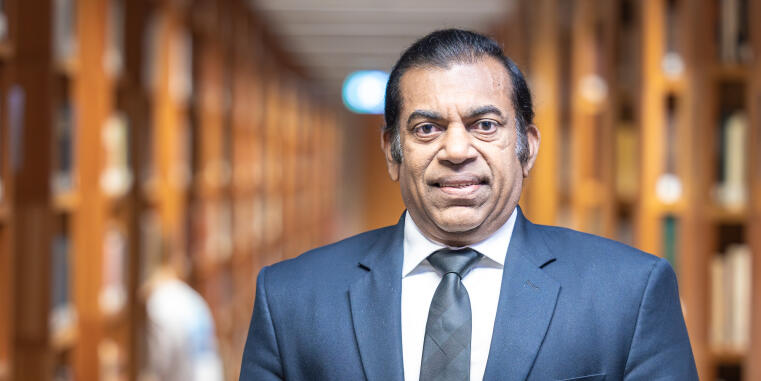-By Professor Pathibha Mahanama

(Lanka-e-News - 11.Sep.2025, 10.45 PM) One of the most striking developments in Sri Lankan society over recent decades has been the visible rise of organised crime in the aftermath of terrorism’s defeat. What began as an undercurrent has now grown into a pervasive threat to public safety and daily life. The public’s own reactions—welcoming whenever notorious figures are finally brought to justice—speak volumes about the gravity of the menace.
At the heart of many of these criminal syndicates lie two main trades: narcotics trafficking and contract killings. Supplementing them are kidnappings, intimidation rackets and a host of other crimes. A closer look at the composition of these gangs reveals a troubling pattern: a significant number of their members are deserters from the armed forces. Men trained in weapons and military tactics, having left the services without sanction, are now turning those very skills to extortion and violence, often finding in crime an alternative livelihood. International reports make clear that this phenomenon is not unique to Sri Lanka, but the drug trade has become the most prominent magnet. Crushing the narcotics networks, experts argue, would in turn cripple much of the underworld’s operations.
The question of where these gangs conduct their business is revealing. Evidence has surfaced that many operations are directed not from the streets but from inside the country’s prisons. Extortion and threats are relayed from behind bars, often through illicit mobile phones. That such a system has flourished points to disturbing failings in oversight.
Another unmistakable trend is the internationalisation of Sri Lankan organised crime. The United Arab Emirates has become a favoured base, largely because of its permissive environment for money laundering. Sri Lankan underworld leaders, some residing with their families in Dubai, Malaysia and Indonesia, continue to orchestrate operations with relative impunity. Even when they are arrested abroad, their families sustain the networks, and the gangs adapt accordingly.
Globally, many nations have responded to such threats with dedicated laws—“Organised Crime Acts”—crafted precisely to dismantle criminal syndicates. Sri Lanka, however, still relies on the archaic Penal Code, which defines crimes such as murder and attempted murder but does not address the organised dimension. The Prevention of Terrorism Act, introduced in 1979, once attempted to fill this gap. But its misuse—sometimes to target rivals rather than terrorists—has left a damaging legacy. Some politicians, exploiting loopholes, extended protection to criminal groups; gang leaders imprisoned on murder charges were released under presidential pardons, while others became enforcers for political patrons.
The original aim of the Prevention of Terrorism Act was sound, but its history is littered with episodes of abuse. The misuse of extraordinary laws to settle scores or cultivate gangs has weakened trust. Meanwhile, countries like the United States have introduced fresh homeland security legislation to face similar threats.
Organised crime, at its core, is the coordination of serious offences—financial fraud, narcotics, armed robbery—by structured groups. Tackling such groups requires powers beyond ordinary policing, and in many countries special courts have been established to expedite trials. Sri Lanka’s government has signalled its intent to follow suit, recognising that ordinary courts, already burdened, cannot keep pace.
Speed matters. Granting bail to suspects often enables them to regroup and retaliate. A dedicated court for organised crime could prevent such delays. Likewise, cooperation with international policing agencies, backed by strong extradition treaties, is essential. Sri Lanka’s existing partnership with Interpol has already given weight to its red notices abroad, but the framework must be strengthened.
Equally critical is ensuring that prosecutions follow swiftly once arrests are made. Under President Chandrika Bandaranaike Kumaratunga, Sri Lanka signed the UN Convention against Torture in 1994, creating special provisions for trials in the High Court. The precedent shows how international conventions can bolster domestic justice.
Specialised police units are also key. Officers trained in Singapore, the United States and the United Kingdom have acquired world-class expertise in dismantling organised networks, and Sri Lanka would do well to draw on their support. New technologies—from digital surveillance to data-sharing—are indispensable in this fight.
But the law alone is not enough. Public vigilance remains vital. Gang rivalries often erupt in gunfights on open streets, undermining the sense of safety in ordinary communities. Citizens who report suspicious activity must be protected under a structured system of witness and informant safeguards.
The current government has placed crime-fighting prominently in its policy pledges, and initial steps have been taken. Yet the path ahead is fraught with difficulty. Organised crime groups in Sri Lanka are not isolated entities; they are tethered to transnational networks and, all too often, to political patrons at home. Weakening these ties will demand political will, international cooperation, and a systematic framework for gathering and protecting intelligence.
Only then can the country hope to dismantle the criminal empires that have taken root in the shadows of post-war Sri Lanka.
-By Professor Pathibha Mahanama
---------------------------
by (2025-09-11 17:14:18)
Leave a Reply